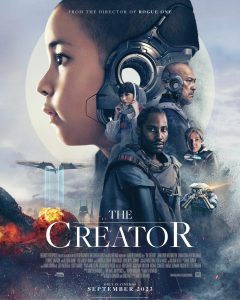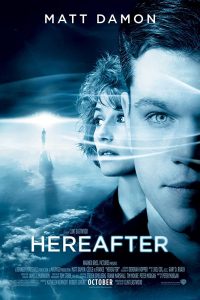Uncanny Valley of the Shadow of Death: Arley Sorg and Josh Pearce Discuss The Creator
 If you’re looking for a high-production, visually slick science fiction movie that isn’t tied to an existing IP monstrosity, The Creator might be the film for you. However, if you’re tired of machine uprisings and AI paranoia, you might want to skip this one.
If you’re looking for a high-production, visually slick science fiction movie that isn’t tied to an existing IP monstrosity, The Creator might be the film for you. However, if you’re tired of machine uprisings and AI paranoia, you might want to skip this one.
Broadly, The Creator follows Sgt. Joshua Taylor (John David Washington) on a near-future journey through “New Asia.” The Americans want to kill or capture Nirmata, the fabled creator of an AI viewed by the West as a threat to human existence. Taylor wants to locate his missing-and-maybe-fridged wife, Maya (Gemma Chan). These goals overlap when the US military learns that the machines are developing a weapon capable of destroying the humans’ orbital ship, the Nomad, which frequently carries out missile strikes on humble villages.
Arley: Would we recommend this movie? Let’s jump to that.
Josh: I’d recommend it because it’s got a lot of cool sci fi stuff in it. There are some pretty good moments. Performances are good, visuals are good. There are interesting characters with character development, and some humor. I think the worldbuilding actually was really cool, with a lot of small details that buttress it up. It’s a world that I was getting immersed in, if you just skate past a lot of plot holes.
Arley: The visuals are really good. It just gets to a point where I feel like, “Okay, yeah, I’ve seen it. I get it, it’s a cool visual. Can we please move to the next scene?” Especially since they come back to a handful of specific visuals over and over again – kind of like the kid in class who tells a joke that makes everyone laugh, then keeps telling it until it wears out. But it is a spectacle and I think it will play out better on a big screen.
As Taylor moves forward in his quest, we get to see the futuristic world unfold through two main backdrops: an LA that has been partially destroyed by a nuclear blast, and the indeterminate Southeast Asian country where robots, simulants, AI, and sympathetic humans live together. “New Asia” was filmed primarily in Thailand, and the locations are gorgeous, which director Gareth Edwards takes time to showcase with establishing shots in ultra-wide aspect ratio, and with cutaways to small details in local architecture or muted interactions between tertiary characters. These calmer moments serve to slow down the pursuit pace of the main plot and provide a bit of breathing room during otherwise relentless violence.
Atop the natural scenes is a stunning layer of visual effects. The style is familiar from A.I. Artificial Intelligence, Blade Runner 2049, and District 9 (we don’t talk about Chappie). Unfortunately, as soon as your eyes adjust to the visual feast and start to focus on the rich sea of characters within it, they’re invariably obliterated by the fully armed and operational weapons platform constantly hovering overhead.
Josh: The visual style looks really similar to Tales from the Loop, that show that’s based on Simon Stålenhag’s art work. It looks so much like it was drawn straight from his book that I was sure he did art design on this film, but I can’t find any evidence of that.
Arley: There were a lot of visual references though. I wasn’t sure if they were deliberate or if it was just the inevitability that some sci fi stuff will remind you of other sci fi stuff.
Josh: One that stood out to me was the two robots boxing in the opening montage. That’s Real Steel, which is a shitty movie, but a pretty good Twilight Zone episode. Or maybe it was just referencing Rock ‘Em Sock ‘Em Robots.
Arley: I have really mixed feelings about the whole New Asia thing.
Josh: All of Asia is the same place, apparently.
Arley: Yeah, and it’s totally fine to just randomly drop bombs all over it.
Josh: Seemed like it was trying to be a Vietnam War metaphor, but with robots. The thing that surprised me the most was when those tanks came out, and how big they were. And they’re just emblazoned on the side with “US Army.” Wow, that is not even a metaphor anymore.
Arley: The huge tanks were really cool, in terms of the spectacle aspect of the movie! But overall the film felt like a commentary on racism while also being lightweight racist. The first thing the tank does is roll over a house like, “America, fuck yeah!” You know, a house in a New Asia village, since New Asia seems to be an assembly of beaches and mountains and forests and “exotic” villages.
As seen in the trailer, Taylor manages to find the secret weapon, and it turns out to be a simulant child (Madeleine Yuna Voyles) who can control other electronic devices and appears to know the locations of both Nirmata and Maya. Taylor defies orders to kill the weapon, and instead follows her deeper into enemy territory.
Having a magical child as your MacGuffin is also nothing new — we’ve seen it in Space Sweepers, Midnight Special, Looper, and many others — but fortunately, Voyles here is not an obnoxious child actor; she is effective, delivering powerful moments through quiet looks and pointed lines. Her scenes with Washington are charming and humorous. By the time he develops a genuine fondness for her, enough precisely calculated emotional moments sway us toward sympathy for the machines (if we hadn’t already, earlier).
Arley: Okay, I actually really liked the acting between these two characters.
Josh: We talked in Tenet about John David Washington just playing it flat the whole way, without modulating his emotions or anything at all, which fit with that movie. But here he gives a completely different performance.
Arley: He nails everything.
Josh: Good job injecting a lot of humor into some pretty fucked up situations.
Arley: I definitely laughed a couple times. I think you did, too.
Josh: Especially when you’ve got a monkey with a bomb, or you put in a good kid character who just does kid things. It’s an easy win.
Arley: They knew how to exploit things, how to take advantage of the audience on an emotional level. Dogs, monkeys, kids, certain kinds of jokes and moments. But I had that meta moment of realizing that they’re exploiting everything, yet still enjoying it, because it was good, it was well-executed. The thing I really appreciated about the directing was the shots of the people, especially some of the close ups. I’m guessing this has to do with a few other people as well, but there were so many evocative moments captured by those shots. I didn’t really start thinking about it until a later shot with the kid, which I guess was a bit more expected, but stood out as still effective and skillful. And I was like, okay, a crying child right where I thought we’d have a crying child, but everything is playing so well that it’s still hitting me on an emotional level. So – in some ways, predictable but that’s okay, because it still works, it does what it sets out to do.
Adding fantastic creatures to realistic settings is Gareth Edwards’ specialty, as evidenced by his ultra-low-budget debut, Monsters, the effects for which he single-handedly created on his bedroom computer. He brought some of that same guerilla filmmaking sensibility to The Creator, to cut down its budget. He also brought one of his Rogue One writers, Chris Weitz.
The Creator carries some of that Star Wars DNA in it: scifi megastructures and mega weapons, saboteurs and spies, droids, chosen ones, mystical forces, heroic sacrifice to bring down an evil empire. Admittedly, all fairly typical, nothing new. Edwards worked so hard to fit these pieces into a fresh universe, though, that he didn’t give his story that final polish, leaving plot holes big enough to fly an X-wing through.
Josh: The plot was really simple because it’s basically Avatar 2. These soldiers are chasing their traitor who has gone over to the other side, and Allison Janney’s character is very similar to the bad guy in that.
Arley: I am proud to say I did not watch Avatar 2, but the story here felt very derivative. I was trying to make this one feel more fresh than it really was, to be honest – there were so many cool things about it that I wanted it to really excel.
Josh: And I called every single plot point in the first two minutes.
Arley: Literally. Out loud, in the theater.
Josh: The nonlinear storytelling, or flashbacks, worked pretty well. That was a simple technique to keep interest in the story.
Arley: There is some style to the film. But there are all these little details that really don’t make sense. I’ll just give one example and then let it go. The scene with the dude coming across the bridge, and there’s like, six robots shooting at him —
Josh: They’re machines. They should have perfect aim.
Arley: Exactly! I guess it’s more Star Wars DNA, since storm troopers have a hard time hitting anything. Okay. I said I’d only say one, but there are just so many little details that mess up this movie. The fact that the robots have an off button — this is how many years in the future? And you’re running a resistance, and nobody thought, oh, I’ll just create a workaround or disable this off button so humans can’t just… you know. Turn me off.
Josh: They have this super advanced weapon but no one put a tracker in the child. Wouldn’t you want to know where that thing is at all times?
Arley: And how are you gonna choke out a robot?
Josh: Oh yeah, we had that same problem with Jung_E!
Arley: I’m like, aren’t they strong? Are they not strong? You are… wait, you’re physically overpowering… alright. I don’t understand.
Josh: The rules are a little uneven.
Arley: You know what makes it hard to sneak up on a camp? When you have a giant floating thing with bright lights slowly approaching from above. And why are the lights making sound?
Josh: I dunno, but the Radiohead song was nice!
It’s entirely possible to dismiss this movie as just another AI movie. (This is the third AI movie we’ve reviewed this year, and we didn’t even talk about the new Mission: Impossible.) If you read the synopsis of The Creator, or any description online, you’d likely think, “I’ve already seen this. I know this story.” But this is a movie saved by its marketing team, because the preview convincingly sells it as something completely new.
It does diverge from the typical Frankenstein story eventually. Humanity’s creation is not out to destroy its creator. Even that — “robots just want to live in peace” — is not entirely original (The Animatrix, for example), but at least the filmmakers took a route less often explored in blockbuster scifi.
Arley: The real problem here is that I think the narrative focus or the narrative thrust is really about the dude’s journey, and if it wasn’t about that, it would probably be a richer movie. If the focus had actually really been on something more creative and unexpected. You know, the revolution or whatever… I was thinking about Shin Godzilla, for example, which is more about the collective —
Josh: Mass protagonists.
Arley: — and not just focusing on one person, it would have been much stronger, more interesting, and probably would have avoided a lot of the lightweight racism.
Josh: I did like the very end where the journey of it ended up being that he’s a destructive force, and that aspect is necessary to perpetuate the cycle of reincarnation. That’s very interesting. It’s just barely touched upon and then they go and focus on something else. I was also trying to figure out how the child was connected to him. I thought the child was going to be the new Nirmata. Is there a giant AI that’s reincarnating into different bodies, and it’s like how they search for the next Dalai Lama? They have to go find a child that has been reincarnated and figure out if it’s the real one.
Arley: There are a lot of Asian philosophical and religious motifs, details, and so on in this one, from character names to visual images and more. Even the kid is a fairly standard Buddhist-style avatar reborn archetype, as seen through a “Western” perspective. If you have a deeper understanding of the cultures that inspire these details, it will probably strike you as cultural tourism, or worse. Grumbles aside, I really enjoyed the movie for the positives, I’m glad I watched it and I feel like it was money well spent. I’m glad I didn’t wait to watch it on a small screen.
Josh: For further reading, I recommend Ian McDonald’s “The Little Goddess,” first published in Asimov’s 6/05: A young girl in Nepal is chosen to smuggle a godlike AI in her head, because the US fears the singularity and has banned AI above a certain intelligence. Again, nothing’s wholly original, but some things are less unoriginal.
Directed by: Gareth Edwards
Written by: Gareth Edwards & Chris Weitz
Starring: John David Washington, Madeleine Yuna Voyles, Gemma Chan, Allison Janney, Ken Watanabe, Sturgill Simpson, Amar Chadha-Patel, Marc Menchaca, Robbie Tann & Ralph Ineson

JOSH PEARCE has stories and poetry in Analog, Asimov’s, Beneath Ceaseless Skies, Cast of Wonders, Clarkesworld, IGMS, Nature, and more. Find him on Twitter: @fictionaljosh, or at fictionaljosh.com. One time, Ken Jennings signed his chest.
ARLEY SORG, Senior Editor and associate literary agent at kt literary, has been part of the Locus crew since 2014. Arley is a 2023 Space Cowboy Award recipient and a 2022 Kate Wilhelm Solstice Award recipient. He is also a 2021 and 2022 World Fantasy Award finalist as well as a 2023 and 2022 Locus Award finalist for his work as co-Editor-in-Chief at Fantasy Magazine. He is a 2022 Ignyte Award finalist in two categories: for his work as a critic, and for his essay “What You Might Have Missed” in Uncanny Magazine. Arley is Associate Editor and reviewer at Lightspeed & Nightmare magazines, columnist for The Magazine of Fantasy and Science Fiction, and interviewer at Clarkesworld Magazine. He grew up in England, Hawaii, and Colorado, and lives in the SF Bay Area. A 2014 Odyssey Writing Workshop graduate, he can be found at arleysorg.com – where he has started his own “casual interview” series with authors and editors – as well as Twitter (@arleysorg) or Facebook.
 While you are here, please take a moment to support Locus with a one-time or recurring donation. We rely on reader donations to keep the magazine and site going, and would like to keep the site paywall free, but WE NEED YOUR FINANCIAL SUPPORT to continue quality coverage of the science fiction and fantasy field.
While you are here, please take a moment to support Locus with a one-time or recurring donation. We rely on reader donations to keep the magazine and site going, and would like to keep the site paywall free, but WE NEED YOUR FINANCIAL SUPPORT to continue quality coverage of the science fiction and fantasy field.
©Locus Magazine. Copyrighted material may not be republished without permission of LSFF.








I liked the movie because it had a moral dilemma and characters (presumably, together with the audience) pondered over it. I also suspect that the plot holes were somewhat misguided attempts to make the robots more human like and to make a stronger point about the mistreatment that the south/east/… Asian people have gotten though history by the various colonization attempts… It is probably not by chance that the African-American played the lead, too. So, it was a very political movie, wrapped in a nice visual eye-candy. In some ways it reminded me of the novel Escape Attempt by Strugatsky brothers, that is being filmed in Poland, of all places.
My criticism is that the movie would have benefited from some more additional ambiguity – what if there were militant fractions among the robots, just like people differed in their acceptance of the robots?